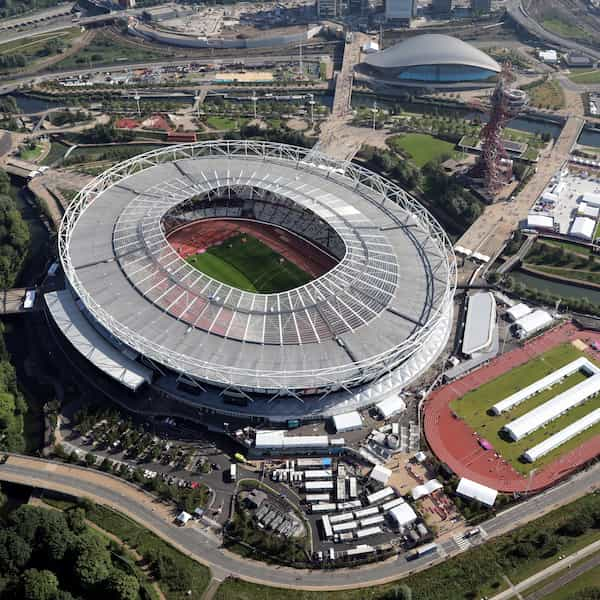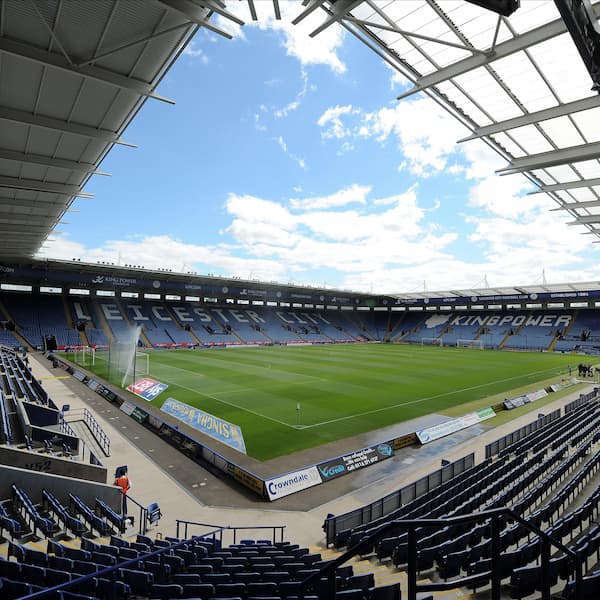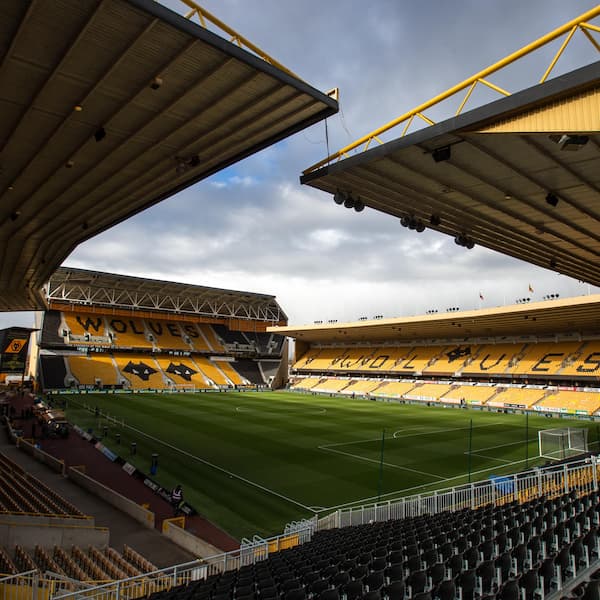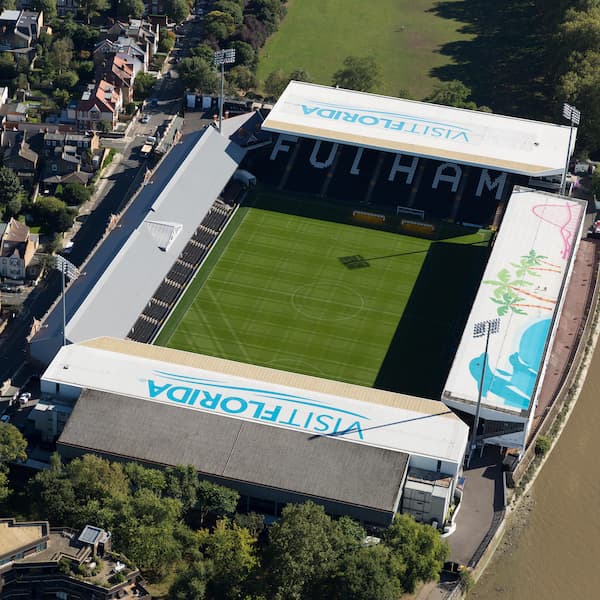Soccer stadiums are special places. In England, they are almost invariably single-use grounds, where soccer is the only sport played. Unlike in some other European countries, ground-sharing is virtually non-existent in England. This means each stadium is bound up with the identity of a club.
Impressive range of bonuses
1 of the world's top sportsbooks
Promo Code WSN365
Bet $5, Get $150 in Bonus Bets Win or Lose
21+ and present in OH. Gambling Problem? Call 1-800-GAMBLER
We have provided some information about all 20 Premier League stadiums and ranked them from worst to best.

Opened: 2012
Town or City: London
Capacity: 60,000
Built as the centerpiece of the 2012 Olympic Games in London, West Ham inherited the stadium four years later. It remains unpopular with the majority of the club’s supporters, who compare it unfavorably to the Hammers’ former home, Upton Park.
The London Stadium was not built for soccer. The seats are far away from the pitch, which is a common bugbear of English fans in particular. Its location behind a shopping centre does it no favours either. The very best soccer stadiums are nestled within the heart of the community, and the London Stadium fails miserably on that count.
Opened: 1883
Town or City: Burnley
Capacity: 21,944
With room for just 21,944 fans, Burnley’s Turf Moor is the smallest stadium in the Premier League. In many ways that feels apt: the Clarets are also one of the division’s smallest clubs and have done extremely well to punch above their weight in recent years.
Burnley have been tenants of Turf Moor ever since it opened in 1883. It is an old-fashioned ground that can produce a raucous atmosphere, but it now feels a little dated and in need of a refresh.
?️ St Mary’s Stadium, cidade de Southampton, costa sul da Inglaterra. pic.twitter.com/GM0xZmBFZ6
— Futebol Virtual Nostalgia (@FVNostalgia) March 14, 2021
Opened: 2001
Town or City: Southampton
Capacity: 32,505
Southampton’s former home, The Dell, was anything but nondescript, yet that feels like an accurate description of St Mary’s. A modern stadium that celebrates its 20th birthday in 2021, Southampton’s ground has little in the way of distinguishing features.
The facilities are good and St Mary’s is a pleasant enough place to visit, but it is perhaps the least memorable of all 20 Premier League grounds. The bowl-shaped design, with filled-in corners and no variations between the four stands, is perhaps the main reason for this.
Opened: 2008
Town or City: Falmer, East Sussex
Capacity: 30,750
Another relatively new stadium on the south coast of England, the Amex Stadium benefits from a more unique design, with one three-tiered stand and three made up of single-tiers. Its curved roof is another attractive feature.
Brighton’s ground loses points for its location, though. Falmer is a small village that hosts the University of Sussex but not much else. Supporters need to get a train from Brighton to reach the out-of-town Amex Stadium.
Find out all the details as we look to celebrate diversity and support equality action ?
— Chelsea FC (@ChelseaFC) March 11, 2021
Opened: 1877
Town or City: London
Capacity: 40,834
Stamford Bridge is the second-oldest stadium in the Premier League, and it is starting to feel that way. The ground is unrecognizable from the 1990s let alone 1877 (or 1905, when Chelsea moved in) but it just does not feel in keeping with the status of the club that calls it home.
Chelsea have been looking at ways to renovate Stamford Bridge in recent years, but plans to expand the capacity to around 60,000 were put on hold in 2018, supposedly because of an “unfavorable investment climate”. Speculation suggested the real reason was Roman Abramovich’s annoyance at the British government’s decision to not renew his visa.
Opened: 1924
Town or City: London
Capacity: 26,309
Visiting supporters regularly grumble about Selhurst Park’s perceived inaccessibility, but that is unfair on a stadium with three nearby railway stations. Other criticisms, such as the relatively large number of restricted-view seats, are much more valid.
Selhurst Park is unashamedly old-school, and those seeking an authentic soccer experience could do worse than head to Crystal Palace’s ground.
Selhurst Park has one of the best atmospheres in the Premier League, but that does not alter the sense of shabbiness. Perhaps a planned renovation will smooth over some of the rough edges.
☀️?️#EVEBUR ? pic.twitter.com/35Mw49Txnf
— Everton (@Everton) March 13, 2021
Opened: 1892
Town or City: Liverpool
Capacity: 39,414
Everton will soon be playing soccer at a brand new stadium. The club hope to move into a new ground on Bramley-Moore Dock in 2023 or 2024, which means they will soon be bidding farewell to Goodison Park. That will be an emotional moment for a team that has been at its current home since 1892.
Goodison Park has poor sightlines in many places and is rough around the edges, but that is part of its charm. Everton’s ground can generate a terrific atmosphere and can be an intense place for opponents to visit, but it is clear why the Toffees are seeking a more modern home.
Opened: 1900
Town or City: West Bromwich
Capacity: 26,850
The highest ground in England at 551 feet above sea level, The Hawthorns is an enjoyable place to watch soccer. West Brom’s home can produce an excellent atmosphere when it is packed to the rafters, and every seat in the house offers a good view – something that cannot be said for other stadiums that are more than 100 years old.
The Hawthorns works because its long history lends it character, while recent developments make it more comfortable than the likes of Goodison Park or Selhurst Park. On the negative side, it is not particularly memorable.
? Emirates Stadium
? Barcelona
? February 16, 2011Were you there that night? Let’s see your photos ? pic.twitter.com/YtxwFixX7f
— Arsenal (@Arsenal) February 16, 2021
Opened: 2006
Town or City: London
Capacity: 60,704
In the late 1990s, Arsenal decided to leave Highbury, their home of almost 100 years, because they felt they needed a bigger stadium to compete at the highest level. The move to the Emirates Stadium was completed in 2006, but the Gunners have not won the Premier League title since leaving their old ground.
Pleasingly, the Emirates Stadium is located very close to Highbury and in among houses, shops and businesses as has traditionally been the way for soccer stadiums.
Unfortunately, the world-class facilities are accompanied by one of the worst atmospheres in the Premier League. The Emirates just does not have the character that Highbury did.
Opened: 2002
Town or City: Manchester
Capacity: 55,017
Like West Ham’s London Stadium, the Etihad Stadium was not initially built to host soccer. Its original purpose was to host the 2002 Commonwealth Games, before becoming Manchester City’s new home a year later.
The key difference with the London Stadium is that the Etihad Stadium was always going to be converted into a soccer ground. The design is attractive and the sky-blue seats are unique among Premier League teams, but the Etihad is marked down for an average atmosphere.

Opened: 2002
Town or City: Leicester
Capacity: 32,312
The King Power Stadium is a good example of a modern stadium done well. Some Leicester fans feared that they would not be able to recreate the atmosphere of Filbert Street at their new home, but the King Power can generate an almighty din.
The England national team have played four games at Leicester’s ground, while rugby union matches have also taken place there. It is a little way out of the city center but still walkable for those arriving by train.
Opened: 1910
Town or City: Manchester
Capacity: 74,140
Manchester United is one of the two biggest clubs in England, so it stands to reason that their ground is one of the most famous in the world. United has now been based at Old Trafford for 111 years, having first moved in way back in 1910.
The largest stadium in the Premier League, Old Trafford is the only ground in the division to house more than 70,000 spectators. A trip to the Theatre of Dreams is on every soccer fan’s bucket list, but Old Trafford is beginning to show its age these days.

Opened: 1889
Town or City: Wolverhampton
Capacity: 32,050
Opened in 1889, Molineux is another stadium with a rich history. It was considered one of the best soccer grounds in England for a time, and hosted some of the earliest European club games during Wolves’ heyday of the 1950s. It was also one of the first stadiums to have floodlights installed, enabling matches to kick off after sunset.
Molineux produces a fantastic atmosphere and the gold seats to match the club’s jersey are beautiful. The steep stands allow great views of the action, but pre-game fireworks displays are not to the liking of traditionalists.
Opened: 1892
Town or City: Newcastle
Capacity: 52,388
There are few cities in England where the football club is as big a part of the local identity as in Newcastle. The Premier League’s sleeping giants have one of the most loyal fan bases in the country, and St James’ Park crackles with energy and excitement when things are going well for the Magpies.
Perched on a hill in the city centre, St James’ literally and figuratively towers over Newcastle. Two of the stands are very tall, though, which means some spectators are miles away from the action.

Opened: 1896
Town or City: London
Capacity: 25,700
Located right next to the River Thames, Craven Cottage is the most picturesque stadium in the Premier League. Supporters can arrive at the ground by taking a lovely riverside stroll through a nearby park, while more enterprising fans have been known to hire a boat to transport them to Fulham’s home.
Craven Cottage does indeed contain a cottage which traces its origins back all the way to 1780. Fulham’s quaint stadium has plenty of charm, but the home fans do not generate the best atmosphere and it is rickety and run-down in places. Work is under way on the expansion of the Riverside Stand.
Impressive range of bonuses
1 of the world's top sportsbooks
Promo Code WSN365
Bet $5, Get $150 in Bonus Bets Win or Lose
21+ and present in OH. Gambling Problem? Call 1-800-GAMBLER
Opened: 1855
Town or City: Sheffield
Capacity: 32,125
Bramall Lane celebrated its 165th birthday in 2020, making it the oldest major stadium in the world still to be hosting professional soccer matches. By extension it is the oldest ground in the Premier League, although it only became Sheffield United’s home in 1899 having initially been used to host cricket matches.
Bramall Lane oozes history, but regular renovations mean it is not run-down or outdated. Sheffield United’s ground continues to produce a fantastic atmosphere, particularly under the floodlights during night-time games.
As well as cricket, Bramall Lane has also played host to rugby matches and even been used for boxing contests.
? Anfield Stadium
? Liverpool
??????? LFC
? 54,074#StadiumCheck #UEFA #Champions #ChampionsLeague #Neuer #lfc #ywnwa #Anfield #champions #liverpoolfc #estadio #stadium #soccer #Stade #Stadion #stadio #football #futbol #grass #GroundHopper #Away #Travel #soccertravel pic.twitter.com/NQt7EjqGFj— StadiumCheck (@StadiumCheck) September 4, 2020
Opened: 1884
Town or City: Liverpool
Capacity: 53,394
The most iconic stadium in English soccer, Anfield deserves its legendary status. The atmosphere for big games is unrivaled, and the single-tier Kop is world-famous for its wit, loyalty, and ferocious backing of the team.
Liverpool have considered leaving Anfield at times in recent years, but current owner Fenway Sports Group decided to shelve plans for a new ground. Instead, a new Main Stand was built to take the capacity above 53,000 for the first time since Anfield became an all-seater stadium.
Opened: 1897
Town or City: Leeds
Capacity: 37,890
With fans currently absent from stadia across English soccer, Leeds are desperately waiting for their first full-house for a Premier League game since 2004. Elland Road is one of the most atmospheric grounds in the country, with the home fans able to generate terrific noise.
Built-in 1980s, Elland Road has been Leeds’ home ever since. Each of the four stands is distinct, with the highlight being the Jack Charlton East Stand which holds close to 15,000 fans. A little way out of the city center, Elland Road is well worth the 40-minute walk.
Football: Tottenham Hotspur Stadium to host WSL north London derby https://t.co/p1iMgjSkdU pic.twitter.com/zSdSuhQv5a
— CNA (@ChannelNewsAsia) March 9, 2021
Opened: 2019
Town or City: London
Capacity: 62,303
The Premier League’s newest ground is also it’s most spectacular. Opened in 2019 after Spurs moved out of White Hart Lane at the end of the 2016/17 season, the Tottenham Hotspur Stadium provides the club with a state-of-the-art home that is the envy of sides across Europe.
The standout feature of Tottenham’s new stadium is the magnificent single-tier South Stand, which holds 17,500. The ground has an overall capacity of 62,303, second only to Manchester United in the Premier League.
On the subject of stadiums, what’s your favourite traditional football stadium?
For me it has to be Villa Park, brilliant ground. pic.twitter.com/EZr03TiG5W
— Footy Accumulators (@FootyAccums) September 11, 2017
Opened: 1897
Town or City: Birmingham
Capacity: 42,785
Villa Park has a bit of everything, and that is why it gets the No.1 spot in our ranking of Premier League stadiums. It was opened in 1897 and therefore is a historic, authentic English soccer ground, but it does not feel tired or in need of a refresh.
Aston Villa’s ground holds almost 43,000 fans, yet it still feels compact with the fans close to the action. The Holte End’s original brick façade and mix of claret and blue seats are wonderful additional touches, and the stadium is accessible by public transport and right in the heart of the community.
If you ever have a choice of Premier League stadiums to visit, Villa Park should be your No.1 pick.
/fit-in/400x235/1745489689/liverpool-vs-tottenham-hotspur-2025-04-27.jpg)
Liverpool vs. Tottenham Hotspur Prediction: Premier League Title Awaits
15 hours ago | Greg Lea/fit-in/400x235/1745306059/manchester-city-vs-aston-villa-2025-04-22.jpg)
Manchester City vs. Aston Villa Prediction: Top-five Rivals Clash
3 days ago | Greg Lea/fit-in/400x235/1665739173/top-4-predictions.jpg.jpeg)
Premier League Top Four Odds, Predictions, Picks 2025
3 days ago | Greg Lea
We support responsible gambling. Gambling can be addictive, please play responsibly. If you need help, call
1-800-Gambler.
WSN.com is managed by Gentoo Media. Unless declared otherwise, all of the visible content on this site, such
as texts and images, including the brand name and logo, belongs to Innovation Labs Limited (a Gentoo Media
company) - Company Registration Number C44130, VAT ID: MT18874732, @GIG Beach Triq id-Dragunara, St.
Julians, STJ3148, Malta.
Advertising Disclosure: WSN.com contains links to partner websites. When a visitor to our website clicks on
one of these links and makes a purchase at a partner site, World Sports Network is paid a commission.
Copyright © 2025
/filters:no_upscale()/fit-in/320x585/1665751779/best-pl-stadiums-atmosphere.jpg.jpeg)